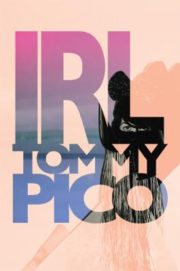 Tommy Pico
Tommy Pico
Birds, LLC ($18)
by Benjamin Voigt
What do you do when the Muse doesn’t text back? This is the question of Tommy Pico’s IRL, one of the most compulsively readable poetry debuts of the past year. An ultra-contemporary epic, IRL keeps it real in a few different ways: it represents life as it’s lived in the language of now, but it’s also honest about the challenges of doing so when you are, to put it bluntly, a survivor of genocide. For Pico, a member of the Kumeyaay nation, real life includes selfies, Beyoncé, and brunch, but also “black mold in shitty mobile / homes” and “forced Indian / boarding schools.”
Written like one long text message (complete with “still-typing” ellipses as section breaks), the book makes myth of the modern, cramming as much contemporary life into its short, slangy lines as it can. It begins as many epics do: with an invocation of the muse. We open with Teebs, the poet’s amped-up alter-ego, “Crushing / on Muse—whose / even slight squint bursts / me into high July— / while dialing, / essentially, a trick.” This is the Iliad imagined as a weekend trip to the Hamptons, the Odyssey where the boats are subways and all those islands parties. It insists that the walk home as a queer person in Brooklyn is a hero’s journey, that a list of hook up kiss-offs can be a Homeric litany. And why not? Read a certain way, Pico reminds us, the old stories were pretty queer on their own. “Srsly, / who didn’t love this Greek / shit as a kid? / So witchy and swishy,” Pico writes. What are the classics if not Olympian trysts and love between brawny heroes?
Pico’s updates to the tradition are often genuinely fun. He’s funny, a sharp observer of social mores who speeds between modes and tones. “As the universe expands,” he writes, “it all / moves slowly away Today / I post a pic of Pangaea / on Insta for #tbt Even geography / is about moving on.” But this rollicking “moving on” has a bleak shadow. “The rush is what I covet—” Pico begins one section, “the / noise of constant motion, / curled in bed on the rez / A sense of options.” The book imitates this rush, but also identifies the pace as a survival strategy, and a means for Pico (and us) to approach intractable subjects—namely, the centuries-long erasure of native peoples, and its lingering effects on Pico and his tribe. What else can you do if your Facebook feed fills with suicides (as it does for Teebs in the book’s first section) but constantly refresh?
“I want America / to know who is still dying / for its sins,” Pico writes, and indeed the book’s most powerful moments come when it confronts us with this, with “metabolic dis- / ease” and “team sports names” and his Uncle Chop who “drank himself to death.” He’s particularly acute about how his background impacts his writing, and how exclusive literary culture can be. “I can’t write poems / the way they must come / to others,” Pico writes, “Can’t use words / like tamp or tincture, n that / makes me feel like a chump.” Indeed, if there is one central narrative to this digressive story, it’s Teebs’s inability to connect with his muse, with the source of artistic voice or inspiration. He’s “crushing” on Muse, but Muse “isn’t crushing” on him, “doesn’t love me, / doesn’t have his shit / together.”
Still, this does not stop Pico from singing, and singing to the gods; despite its topicality, IRL is deeply interested in spirituality, in seeking the sacred that history denied him. “My God,” he laments, “I never got to / know her.” Ultimately, the act of writing itself is his substitute, his way of finding meaning. By singing, karaoke-style, despite self-consciousness, despite marginalization, Pico discovers a space for all his identities—queer artist, city dweller, Internet whiz, rez kid—to coexist. The epic’s capaciousness, its peregrinations, allows him what his people were so often denied. As he writes at the book’s close:
. . . My dad grows
his hair long Black waves
cascade down his back b/c knives
crop the ceremony of his
mother’s hair at the NDN boarding
school I cut mine in mourning
for the old life but I grow
my poems long. A dark
reminder on white pages.
A new ceremony.
At once powerful and playful, old and new, IRL offers its readers something special: it expands our reality, and offers a way forward.
